- Home
- Joel C. Rosenberg
The Tehran Initiative Page 4
The Tehran Initiative Read online
Page 4
4
Firouz could hear the sirens approaching.
The motorcade was almost there. It was time. He carefully poked his head up and looked across the street. To his left stood St. Bartholomew’s Church, at the corner of Park Avenue and East Fiftieth Street. Straight ahead he could see the Park Avenue entrance of the Waldorf-Astoria. Using a laser range finder, he calculated the front doors at precisely 110 meters away, near-optimum distance for the weapon at his side and the one now in Rahim’s hands.
Though his view was slightly obstructed by several trees growing in the median, there were no leaves on the trees this early in the year, which helped. When he had scoped out the twenty-five-story office building, he had briefly considered a higher office, above the trees and with a broader and arguably more commanding view of the street below. But in the end he had opted not to sacrifice distance for a clear sight line. He needed to be close. That was the primary issue. He couldn’t see perfectly, but it would do.
The mob of media types was obvious enough in a roped-off area on the sidewalk to the right of the main doors. Reporters, still photographers, TV cameramen, and producers—they were all there, making final preparations of their own as the first of the police motorcycles rolled in. With red and blue lights flashing everywhere, Firouz counted a half-dozen NYPD uniformed officers standing with or near the press and another fifteen to twenty officers in key positions on both sides of the street, holding back a small crowd and making sure the adjacent streets remained sealed off. He also counted at least a dozen plainclothes agents, a mixture, he assumed, of the Secret Service, the State Department’s Diplomatic Security Service, and the city’s VIP protective unit, as well as Israeli Shin Bet and an Egyptian contingent.
Little did they know they were going to have a front-row seat.
* * *
The motorcade roared up East Forty-Seventh Street.
But Ramzy was not finished. As they turned right onto Park Avenue, the Egyptian leader explained that his intelligence services had two sources inside the royal palace in Riyadh. Neither knew the other’s identity, but that morning, each of them—unbeknownst to the other—had sent urgent messages back to Cairo indicating that the Ayatollah Hosseini, Iran’s Supreme Leader, had personally called the Saudi king twenty-four hours earlier and told him that Iran’s nuclear weapons were operational and that one would be detonated on Saudi soil within the month if His Excellency didn’t welcome the Twelfth Imam, show him proper deference, and prepare a lavish welcome ceremony in Mecca.
It was news to Naphtali, but Jackson was not impressed.
“The NSA picked up the same calls,” he replied. “But if I had a dime for every lie Hosseini has told, the US wouldn’t have a national debt.”
“That’s not the point, Mr. President,” Ramzy pushed back.
“Then what is?”
“The Saudis—keepers of Mecca, keepers of Medina, commanders of the faithful—are being blackmailed by their worst enemies, the Persians. Why? Is it because King Jeddawi, the most devout Sunni Muslim on the planet, has suddenly, secretly converted to Shia Islam? No. It is because he is terrified for his life, for his riches, for his kingdom. He’s convinced Iran has the Bomb, and that has changed everything. And now the neighboring nations will start to fall. First the Saudis, then the Kuwaitis, then the Emirates.”
The car was silent for a moment, save Agent Bruner issuing commands on his wrist-mounted radio. Then the specially designed Cadillac pulled up to the Waldorf’s famous art deco entrance and drew smoothly to a halt. A team of agents jumped out of two black SUVs in the rear of the motorcade and began taking up positions around Stagecoach and Halfback. Bruner issued more instructions, making sure all his men were in place, then turned and caught Jackson’s attention.
“We’re here, Mr. President.”
“In a moment, Mike,” Jackson replied. He had a question he wanted answered before they headed inside. Turning to Ramzy, he asked bluntly, “Abdel, tell me one thing. Why are you more obsessed than Asher here with this whole Twelfth Imam thing?”
Abdel paused for a moment, seeming surprised by the question. “I wouldn’t call it an obsession, Mr. President. I don’t think that’s a fair characterization. Am I concerned? Yes. Deeply. But even more than that, I believe the pharaohs are watching me. I believe all my forefathers are watching me. I will go to them soon. This I know all too well. And when I see them face to face in the afterlife, I don’t want to be received as the man who lost Egypt.”
Jackson pondered that answer, and as he did, he discerned something he had never considered before. “It was you who ordered the assassination of Dr. Saddaji in Hamadan the other day,” he said, looking Ramzy in the eye.
Until just a moment ago, Jackson had been convinced that Naphtali and the Mossad had been responsible for the car bombing that had killed Iran’s top nuclear scientist just two weeks earlier.
Ramzy motioned out the window at Agent Bruner, ready to open the limousine’s back door and usher them past the crowd of journalists and inside the Waldorf to greet the 1,500 guests eagerly anticipating their arrival. “They’re waiting,” the Egyptian said softly.
“So am I,” the president said.
Ramzy looked back at both of them with a twinkle in his eye. “I actually don’t know who did it exactly,” he demurred. “It was a beautiful hit, I agree. But whoever ordered it waited too long. It should have been done six months ago.”
There it was, Jackson realized. A classic nondenial denial. Ramzy wasn’t formally accepting credit or blame, and yet he was. Six months earlier, Jackson remembered, the eighty-two-year-old Egyptian had been undergoing open-heart surgery. He had been bedridden nearly ever since. This was his first foreign trip in almost a year. But just because he hadn’t been traveling didn’t mean Abdel Mohammad Ramzy hadn’t been on the move.
* * *
Firouz summoned Jamshad on his radio.
“Make sure the stairwell is clear.”
“I’m on it.”
“And make sure Navid is in place.”
“Of course—absolutely.”
Firouz then turned to his closest friend and nodded. Each man pulled a black balaclava ski mask over his face and donned protective eyewear.
“Are you ready, Rahim?”
“I serve at the pleasure of the Promised One, Firouz. And you?”
“Yes, my friend, and I count it an honor to complete this mission with you, of all people.”
* * *
Agent Bruner saw Jackson give him the signal.
Immediately he opened the back door of the limo, which at nearly eight inches thick was as impenetrable as a vault door.
“Look sharp, everyone,” he said into his radio, once again scanning the faces in the media section and the crowd across the street. “Renegade’s moving.”
The president stepped out of the car and smiled for the cameras. Then he turned back and helped President Ramzy out of the car as well, carrying his portable oxygen tank for him.
In the harsh glare of the TV lights, Ramzy looked even older than he was, Bruner thought. He moved slowly and with a limp. But to his surprise, even though he knew Ramzy hated the media and typically dodged the press at almost all costs, tonight the Egyptian president seemed drawn to the blizzard of photographs being taken. Indeed, even before the detail of Shin Bet agents could run up from the back of the motorcade, take their positions, and help Prime Minister Naphtali out of the limo, Ramzy hobbled over to the press section and actually took a question shouted out by the New York bureau chief for Al Jazeera.
“What is Sphinx doing?” one agent asked over the radio.
“I don’t know,” Bruner said, “but get two men up at his side—now.”
* * *
Firouz poked his head up one more time.
It was a risk, he knew, but he had no choice. He had brought with him a portable Sony TV and a small satellite receiver. He’d been hoping to watch live coverage of the president’s arrival. He’d hoped th
at would enable him to see precisely what was happening across the street. But none of the networks—American or foreign—was carrying it live, including Al Jazeera, and he was out of time.
Through a pair of high-powered binoculars, Firouz could see Ramzy talking to the press. It was a shocking sight. Firouz had grown up watching television coverage of Abdel Ramzy ruling Egypt with an iron fist. But he couldn’t remember a single time the man had willingly spoken to the press corps. Still, it was a good development. It meant the three leaders would be motionless for a few moments, at least, and that was all they needed.
Firouz scanned further and could see President Jackson a few steps to the Egyptian’s left, closer to the front door of the hotel, which someone was holding open. He could see two Secret Service agents beside the president and several more just a few steps back. There were other men in suits standing there too. One of them looked like Prime Minister Naphtali. Firouz couldn’t be sure, not with the trees obstructing his vision. He desperately wanted absolute confirmation. He realized he should have positioned someone on the ground, another spotter who could have given him more information from a better vantage point. But this was it. He didn’t dare wait any longer. They’d never have a better opportunity than the one now before them.
“Now!” Firouz shouted.
Both men yelled praise to Allah. Then, across the room, Rahim detonated two small packages of explosives the two men had installed on the windows, blowing them out instantly. In a seamless motion, Rahim jumped to his feet. Ignoring the shattering glass, he aimed his RPG-7 at the crowd across the street and pulled the trigger.
5
Ramzy heard something behind him.
Distracted, sensing something was amiss, he turned to see what was happening. At that moment, he heard glass shattering on the sidewalk across the street. He found his dimming eyes drawn to the fourth floor, to the corner office. He saw the flash and the rocket emerging from the window, slicing through the trees, and heading straight for them.
* * *
Bruner heard the glass shatter behind him.
But unlike Ramzy, he didn’t turn. He didn’t need to see what was happening. Everything in him knew it was wrong.
Moving purely by instinct refined by years of training and fueled by a sudden burst of adrenaline, Bruner pivoted hard to his left. He grabbed the president and shoved the man through the Waldorf’s entrance. Then he threw his body on top of Jackson just as a deafening explosion erupted behind them.
Looking back, he watched in horrified amazement as an enormous, searing ball of fire and smoke engulfed the crowd outside. Ramzy’s oxygen tank exploded. Burning wood, molten glass, chunks of brick and plaster were flying everywhere. Huge flames—eight, maybe ten feet high—surged into the lobby, licking the ceiling and setting everything in their path ablaze. A huge glass chandelier came crashing down just yards away from them.
Outside, Bruner could hear the shrieks of men and women being burned alive. He, too, was on fire, but for a split second he didn’t feel a thing. All he could think about was getting the president to safety.
* * *
Rahim instantly dropped to the floor, taking cover.
But now Firouz was on his feet. He pointed the weapon in his hands out the shattered window and tried to aim at the door of the Waldorf. Everything was obscured by leaping flames and thick, black, acrid smoke, which the wind was blowing his way. His eyes began to sting and water even behind his goggles, causing him to hesitate for a moment. But only for a moment. Then, aiming into the center of the chaos, he pulled the trigger and fired anyway.
The nine-pound rocket-propelled grenade exploded from its launcher, and time almost stood still. Everything seemed to go in slow motion. Firouz watched the contrail. He saw the rocket arc over Park Avenue on a trajectory higher than he’d planned. But he wasn’t worried. The impact still had its deadly effect. He saw the grenade slam into the hotel’s exterior wall just above the press corps and erupt into another ghastly ball of fire and death. He could see part of the facade of the historic building beginning to crumble. Better yet, he could hear the screams of the dying intensifying, mounting to a grisly crescendo that sent shivers of ecstasy down his spine.
For a moment, he found himself completely mesmerized by the scene of death and destruction below. But then he heard Rahim screaming at him to get down, and he snapped back to his senses and hit the deck.
Rahim had already reloaded and was back on his feet. Firouz watched as his comrade in arms scanned the scene, pivoted to the right, and pulled the trigger. He desperately wanted to see where the rocket was headed. He wished he could see the results. But at least he heard the explosion. He heard the wrenching sound of burning, twisted, crashing metal and the secondary detonation of a gas tank. He knew immediately that Rahim had fired at one of the Secret Service SUVs. The limousines, after all, were impervious to RPG fire. So Rahim had clearly done the next-best thing. He was faithful. He was fearless. He was striking a blow against the Great Satan in the heart of Manhattan. Soon the Twelfth Imam would know, as would the entire world.
* * *
Bruner could hear automatic gunfire outside.
He could also hear the squealing tires of Stagecoach and Halfback racing away from the scene. He had no idea what the status of President Ramzy or Prime Minister Naphtali might be. Had they died in the attacks? Had someone gotten them to safety? Given all that had just happened, he couldn’t imagine how either man could have survived.
The smoke inside the hotel’s entrance was thick and low. Above him, the sprinkler system had immediately activated. Water sprayed everywhere, but the entire lobby was still engulfed in flames. A fellow agent sprayed him and the president with a fire extinguisher. The pain on Bruner’s back, legs, and arms was unlike anything he had ever experienced, far worse than the time his Humvee had been nearly blown to smithereens by an IED just outside of Baghdad. But Bruner refused to think of himself.
“Mr. President, are you all right?” he shouted above the commotion as he carefully turned Jackson over and quickly checked him for injuries.
The president didn’t answer. He was coughing up blood.
* * *
The corner office erupted with gunfire.
Secret Service sharpshooters had found them. They laid down a withering blanket of suppressive fire, and Firouz felt a wave of fear ripple through him for the first time. He pressed himself to the floor, against the front wall—out of sight, or so he hoped—pleading with Allah for mercy.
But Rahim was not so lucky. Firouz looked on in horror as his best friend’s body was ripped to shreds by dozens of the 7.26mm rounds that came crashing through the windows. He watched as Rahim collapsed to the ground, blood spraying everywhere, his eyes rolled back in his head. His first instinct was to crawl to Rahim’s side to see if he was still alive, but the fire kept coming, and from a high angle—most likely from the roof of the Waldorf.
When the shooting paused—just for a moment—Firouz made his move. He scrambled across the floor and dove into the hall. Almost immediately the gunfire erupted again. But Firouz rolled around a corner unscathed. Breathing hard, his shirt soaked with sweat, he pulled a silencer-equipped pistol from his jacket, jumped to his feet, and raced for the stairwell.
* * *
“We’re going to get you out of here, Mr. President.”
Gritting his teeth, Bruner forced himself back to his feet. With the help of three other agents, he hauled Jackson to his feet as well. That was when he first saw the blood trickling down the side of the president’s face. But this was no place to do a proper assessment. Parts of the ceiling were already starting to collapse. They had to move. Nearly choking on the smoke, Bruner considered their options. The flames were the thickest to their left and right. The only way forward was to head deeper inside the hotel. He had no idea who or what lay ahead, and he couldn’t rule out the possibility of a multiple-front ambush. But at the moment, he didn’t have a choice.
With their
guns drawn, agents were racing toward them from all over the building. Bruner shouted orders to his men to surround and cover them and then began moving the president down the hall and around the corner to an unmarked freight elevator as quickly as they could. Inside, he hit the button for the basement level and cursed until the doors shut and they started descending.
“Six-One, Six-One, I have Renegade,” Bruner shouted into his radio. “I repeat, I have Renegade. We are Code Red and inbound. Hold all radio traffic and prepare to evacuate immediately.”
When the elevator door opened, they were met by four more agents brandishing Uzis. Together, they raced Jackson through the narrow passageway deep underneath the Waldorf until they reached Track 61. There, waiting for them, was an idling Metro-North train. It was already running and loaded with more heavily armed agents and a medical crew. Bruner got the president on board and directed his men to put him on the floor, out of sight. Two physicians began treating him immediately. But Bruner refused to be a sitting duck. He ordered the train to pull out.
The doors closed. The agents around them took up their preassigned positions. Engine One began to move. They had practiced this for years, beginning in 2002 when the Secret Service had run an extensive exercise using this escape route in the lead-up to President Bush’s stay at the Waldorf during the opening session of the UN General Assembly.

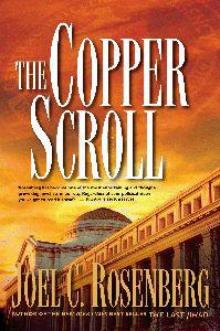 The Copper Scroll
The Copper Scroll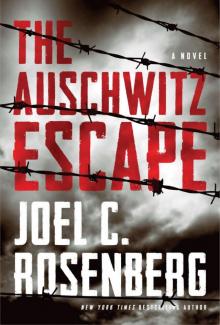 The Auschwitz Escape
The Auschwitz Escape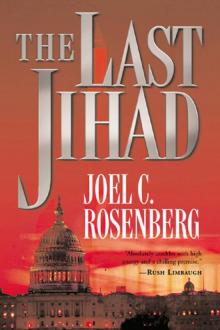 The Last Jihad
The Last Jihad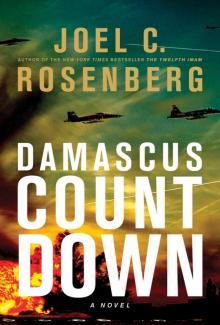 Damascus Countdown
Damascus Countdown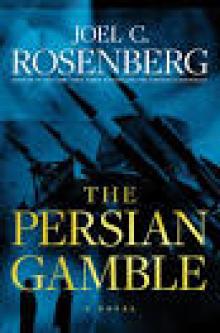 The Persian Gamble
The Persian Gamble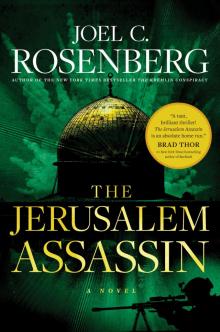 The Jerusalem Assassin
The Jerusalem Assassin Dead Heat
Dead Heat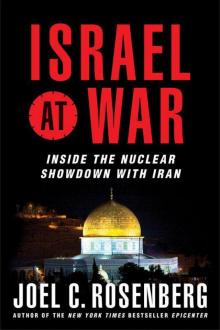 Israel at War: Inside the Nuclear Showdown With Iran
Israel at War: Inside the Nuclear Showdown With Iran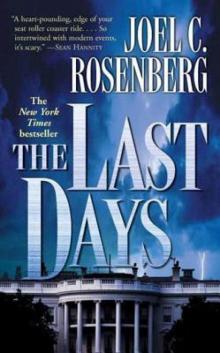 The Last Days
The Last Days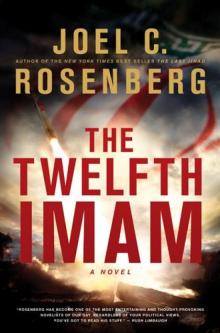 The Twelfth Imam
The Twelfth Imam Epicenter 2.0
Epicenter 2.0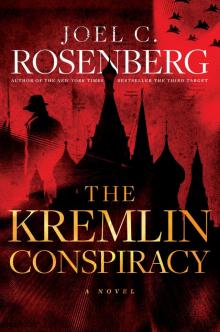 The Kremlin Conspiracy
The Kremlin Conspiracy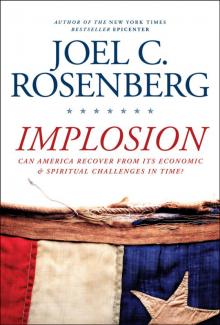 Implosion: Can America Recover From Its Economic and Spiritual Challenges in Time?
Implosion: Can America Recover From Its Economic and Spiritual Challenges in Time?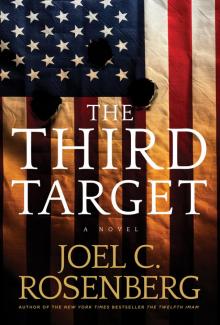 The Third Target: A J. B. Collins Novel
The Third Target: A J. B. Collins Novel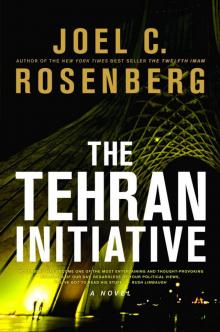 The Tehran Initiative
The Tehran Initiative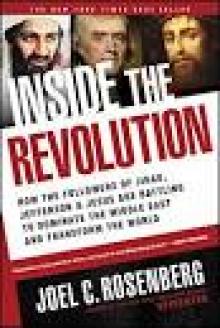 Inside the Revolution
Inside the Revolution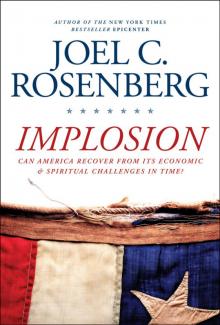 Implosion
Implosion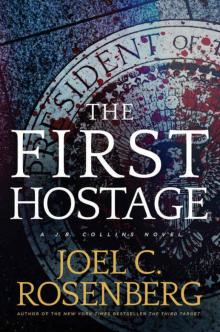 The First Hostage: A J. B. Collins Novel
The First Hostage: A J. B. Collins Novel